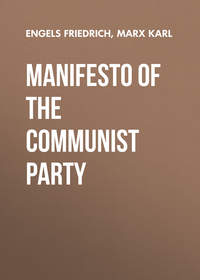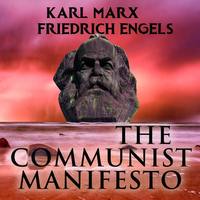 полная версия
полная версияLandmarks of Scientific Socialism: "Anti-Duehring"
(Herr Duehring having applied the two man theory to political economic conditions and having decided that such conditions are unjust, upon which conclusion he bases his revolutionary attitude, Engels remarks as follows):
"If we have no better security for the revolution in the present methods of distribution of the products of labor with all their crying antagonisms of misery and luxury, of poverty and ostentation, than the consciousness that this method of distribution is unjust and that justice must finally prevail, we should be in evil plight and would have to stay there a long time. The mystics of the Middle Ages who dreamed of an approaching thousand years kingdom of righteousness had the consciousness of the injustice of class antagonisms. At the beginning of modern history three hundred years ago, Thomas Muenzer shouted it aloud to all the world. In the English and French bourgeois revolutions the same cry was heard and died away ineffectually. And if the same cry, after the formation of class antagonisms and class distinctions left the working, suffering classes cold until 1830, if it now takes hold of one land after another with the same results and the same intensity, in proportion as the greater industry has developed in the individual countries if, in one generation, it has acquired a force which defies all the powers opposed to it and can be sure of victory in the near future – how comes it about? From this, that the greater industry has created the modern proletariat, a class, which for the first time in history can set about the abolition not of this or that particular class organization or of this or that particular class privilege but of classes in general, and it is in the position that it must carry out this line of action on the penalty of sinking to the Chinese coolie level. And that the same greater industry has on the other hand produced a class which is in possession of all the tools of production and the means of life but in every period of prosperity (Schwindelperiode) and in each succeeding panic shows that it is incapable of controlling in the future the growing productive forces; a class under whose leadership society runs headlong to ruin like a locomotive whose closed safety valve the engine driver is too weak to open. In other words it has come about that the productive forces of the modern capitalistic mode of production as well as the system of distribution based upon it are in glaring contradiction to the mode of production itself and to such a degree that a revolution in the modes of production and distribution must take place which will abolish all class differences or the whole of modern society will fall. It is in these actual material facts, which are necessarily becoming more and more evident to the exploited proletariat, that the confidence in the victory of modern socialism finds its foundation and not in this or that bookworm's notions of justice and injustice.
II. The Force Theory(Herr Duehring argues that the causes of class subjection are to be sought in political conditions and that political force is the primary, and economic conditions merely the secondary, cause of class distinctions Engels makes the following reply to these arguments):
This is Herr Duehring's theory. It is set out, decreed so to say, here and in several other places. But we cannot find the slightest attempt to prove it or to disprove the opposite theory in the three thick volumes. Moreover if there was an abundance of proof we should get none from Herr Duehring, for the matter is proven by the famous fall of man in that Robinson Crusoe made Friday his slave. That was an act of force and so a political act. And this slavery constitutes the point of departure and fundamental fact of history up to the present time and inoculates the heirs of sin with injustice so certainly that only lately it has become milder and "transformed into the more indirect forms of economic dependency." Since the whole of the remaining actual "force-possession" rests upon this original enslavement, it is clear that all economic phenomena can be explained from original political causes, that is from force. And whoever is not satisfied with this is a secret reactionary.
Let us first remark that one has to be as much in love with himself as Herr Duehring is to consider this idea as "original" since it is not so by any means. The idea that the political doings of monarch and states are decisive events in history is as old as the writing of history itself and is the reason why we are so little aware of the real and quietly developing progress of the peoples which goes on behind these noisy and spectacular activities. This idea has dominated the whole of history in the past and got its first shock at the hands of the French bourgeois historians of the Restoration period.
To proceed, let us grant for the present that Herr Duehring is correct when he says that all history up to now has been the slavery of man by men, and we are still a long way from the root of the matter. Let us ask now how it was that Robinson came to enslave Friday. Was it merely for the pleasure of doing so? Surely not. On the contrary we are informed that Friday "was subjugated as a slave or mere tool for economic service and was kept in subjection merely as a tool." Robinson only enslaved Friday that he might work for the benefit of Robinson. And how could Robinson derive benefit from the labor of Friday? Only by virtue of the fact that Friday produced more means of livelihood by his labor than Robinson had to give him to keep him able to work. Robinson has therefore, contrary to Herr Duehring's pretty prescription, made, by the enslavement of Friday, a political organization, not just because he wanted to, but simply as a means of providing himself with food, and he ought to see how little he has in common with his lord and master Herr Duehring.
The childish example therefore which Herr Duehring has discovered in order to show that force is the "historical fundamental" proves that force is only a means to further an economic interest, and in history the economic side is likewise more fundamental than the political. The example therefore proves just the opposite of what it ought to prove. And, as with Robinson and Friday, so it is also with all the examples of lordship and slavery up to now. Slavery, to use Duehring's own elegant expression, always implies a means for supplying sustenance (using the term in its broadest sense) and never merely implies a political organization which has been developed by its own will. One would have to be a Herr Duehring to venture to call taxes only a secondary feature of government, or, to say that the political groupings of the dominant bourgeois of to-day and the subjugated proletariat are purely voluntary and not made to serve the material interests of the bourgeois, namely profit making and the accumulation of capital.
Let us give our attention again to our two men. Robinson "sword in hand" makes Friday his slave. But to do this Robinson uses something else besides his sword. A slave is not made by that means solely. In order to be able to keep a slave one has to be superior to him in two respects, one must first have control over the tools and objects of labor of the slave and over his means of subsistence also. Therefore, before slavery is possible, a certain point in production has to be reached and a certain degree of inequality in distribution attained. And when slave labor becomes the dominant mode of production of an entire society a higher development of the powers of production, of trade and of wealth, accumulation occurs. In early tribal communities which had common ownership of the soil, slavery is either nonexistent or its role is very subordinate. So it was at first in Rome, as a state of farmers, but when Rome became the capital city of the world and the soil of Italy came more and more to be owned by a numerically small class of enormously wealthy property owners, the population of farmers perished in front of the slave population. When at the time of the Persian War, the number of slaves in Corinth was 460,000, and in Ægina 470,000, and there were ten slaves to every freeman in the population, the explanation must be sought in something other than force; there were a highly developed art and handicraft and foreign commerce. Slavery in the United States of America was much less due to force than to the English cotton industry; where there was not cotton grown or where slaves were not raised, as in the border states, for the cotton producing states, it perished of its own accord and without any employment of force simply because it did not pay.
When Herr Duehring therefore calls the property of the present day property resting on force and designates it as "that form of domination which does not merely signify the exclusion of one's fellow beings from the use of the natural means of sustenance, but implies in addition that the subjection of man has lain at the foundation of human slavery" he puts the matter upside down. The subjection of humanity to slavery in all its forms means the control by the master of the means of labor by virtue of which alone he can employ his slaves upon them and the disposal of the means of livelihood by which he can keep his slaves alive. In all cases therefore it implies a certain power of possession which transcends the ordinary? How did this arise? Occasionally it is clear that it was seized and can therefore be said to rest upon force but this is by no means essential. It can be got by labor, be robbed, be obtained by trade, or taken by fraud. It must be worked for generally before it can be stolen.
Private property does not historically come into existence by any means as a rule as the product of robbery and violence. On the contrary. It arises from the limitation of certain things in the early tribal communes. It develops in the first place within the tribe and afterwards in exchange with peoples outside of the tribe in the form of wares. In proportion as the products of the tribe assume the form of commodities, i.e., the less they are produced for the use of the producer and the more for the purpose of exchange, the exchange destroys the original form of distribution in the commune itself, and the more unequal become the shares of the individual members of the community with respect to material possessions. So the old communal ownership of land becomes more and more invaded, the communal property is rapidly converted into a village of farmers, each tilling his own piece of ground. Oriental despotism and the changing government of conquering nomads had no power to alter the old form of communal ownership for a thousand years. But the continual destruction of the primitive domestic industry through the competition of the products of the great industry is bringing about its dissolution. The thing has little to do with force as has lately appeared in the matter of the division of the communal property of the feudal societies on the Moselle and in Hochwald. The peasants are finding the substitution of individual for communal holdings to their interests. Even the growth of a primitive aristocracy as among the Celts, the Germans, and in Mesopotamia, is a result of the communal ownership of landed property, and does not depend upon force in the slightest degree but upon free will and custom. Especially where private property arises it appears as the result of a change in the methods of production and exchange in the interests of the increase of production and the development of commerce and therefore arises from economic causes. Force plays no role in this. It is clear that the institution of private property must have already existed before the robber is able to possess himself of other people's goods and that force may change the possession but cannot alter private property as such.
But to explain the "subjection of men to slavery" in its modern form, in wage-labor, we can make no use of either force or property acquired by force. We have already mentioned the part which the transformation of the products of labor into commodities, their production not for use alone, but for exchange, plays in the destruction of the primitive communal property and therefore in the bringing into existence directly or indirectly the universality of private property. But Marx has proved in his "Capital" – and Herr Duehring does not venture to intrude upon the matter – that at a certain stage in economic development the production of commodities is transformed into capitalistic production and that at this point "the law of appropriation resting upon the production and circulation of commodities, the law of private property, by its own inevitable dialectic becomes changed into its opposite, the exchange of equivalents, which appeared as its original mode of operation, but has now become so twisted that there is only an appearance of exchange since. In the first place, the portion of capital exchanged for labor-force is itself only a portion of the product of another's labor taken without an equivalent, and in the second place, it is not only supplied by its producers, the workers, but it must be supplied also with a new surplus. Originally property seemed to us to be established on labor only – property now appears (as a conclusion of the Marxian argument), on the side of the capitalist, as the right to unpaid labor and, on the side of the workingman, as an impossibility, the ownership of his own product. The difference between property and labor is the result of a law which apparently proceeded from their identity." In other words if we exclude the possibility of force, robbery, and cheating absolutely, if we take the position that all private property originally depended upon the personal labor of its possessor and that equivalents are always exchanged we nevertheless come, in the course of the development of production and exchange, of necessity, to the modern capitalistic methods of production, to the monopolisation of the means of production and livelihood in the hands of a single class few in numbers, to the degradation of the other consisting of the immense majority of producers to the position of propertyless proletarians, to the periodical alternations of swindling operations and trade crises and to the whole of the present anarchy in production. The entire result rests on purely economic grounds without robbery, force, or any intervention of politics or the government being necessary. Property resting on force becomes a mere phrase which merely serves to obscure the understanding of the real development of things.
This course, historically expressed, is the story of the development of the bourgeoisie. If "political conditions are the decisive causes of economic conditions," the modern bourgeoisie would necessarily not have progressed as the result of a fight with feudalism, but would be the darling child of its womb. Everybody knows that the opposite is the case. The bourgeoisie, originally bound to pay feudal dues to the dominant feudal nobility, recruited from bond slaves and thralls, in a subject state, has, in the course of its conflict with the nobility captured position after position, and finally has come into possession of the power in civilized countries. In France it directly attacked the nobility, in England it made the aristocracy more and more bourgeois and finally incorporated it with itself as a sort of ornament. And how did this come about? Entirely through the transformation of economic conditions which was sooner or later followed either by the voluntary or compulsory transformation of political conditions. The fight of the bourgeoisie against the feudal nobility is the fight of the city against the country, of industry against landlordism, of economy based on money against economy based on natural products. The distinctive weapons of the bourgeois in this fight were those which came into existence through the development of increasing economic force by reason of the growth at first of hand manufacture and afterwards machine-manufacture and through the extension of trade. During the whole of this conflict the political power was in the hands of the nobility, with the exception of a period when the king employed the bourgeoisie against the nobility in order to hold one in check by means of the other. From the very moment, however, in which the bourgeoisie still deprived of political power began to be dangerous because of the development of its economic power the monarchy again turned to the nobility and thereby brought about the revolution of the bourgeois first in England and then in France. The political conditions in France remained unaltered until the economic conditions outgrew them. In politics the noble was everything, the bourgeois nothing. As a social factor the bourgeoisie was of the highest importance while the nobility had abandoned all its social functions and yet pocketed revenues, social services which it did not any longer perform. Even this is not sufficient. Bourgeois society was, as far as the whole matter of production is concerned, tied and bound in the political feudal forms of the Middle Ages, which this production, not only as regards manufacture but as regards handwork also had long transcended amid all the thousandfold gild-privileges and local and provincial tax impositions which had become mere obstacles and fetters to production. The bourgeois revolution put an end to them. But the economic condition did not, as Herr Duehring would imply, forthwith adapt itself to the political circumstances, – that the king and the nobility spent a long time in trying to effect – but it threw all the mouldy old political rubbish aside and shaped new political conditions in which the new economic conditions might come into existence and develop. And it has developed splendidly in this suitable political and legal atmosphere, so splendidly that the bourgeoisie is now not very far from the position which the nobility occupied in 1789. It is becoming more and more not alone a social superfluity but a social impediment. It takes an ever diminishing part in the work of production and becomes more and more, as the noble did, a mere revenue consuming class. And this revolution in its position and the creation of a new class, that of the proletariat, came about without any force-nonsense but by purely economic means. Further more, it has by no means accomplished it by its own willful act. On the other hand it has accomplished itself irresistibly against the wish and intentions of the bourgeoisie. Its own productive forces have taken the management of affairs and are driving modern bourgeois society to the necessity of revolution or destruction. And if the bourgeoisie now appeals to force to ward off the ruin arising from the decrepit economic condition it proves thereby that it suffers from the same error as Herr Duehring, in that it thinks that "political conditions are the distinctive causes of economic condition" and that by the use of the prime factor of mere political force it can manufacture the secondary factor of economic conditions. It thinks that it can shape economic conditions and their inevitable development, and therefore eliminate the economic effects of the steam engine, and the modern industry which has proceeded from it. It thinks that it can abolish the world commerce and the bank credit development of to-day from the universe by means of Krupp guns and Mauser rifles.
III. Force Theory (Continued)Let us look at this omnipotent "force" of Herr Duehring a little more closely. Robinson enslaved Friday "sword in hand." How did he get the sword? Robinson's imaginary island never grew swords on trees and some answer to this question is due from Herr Duehring. We might just as well assume that as Robinson became possessed of a sword so, one fine morning, Friday appeared with a loaded revolver in his hand. Thereupon the "force" is entirely reversed. Friday takes command and Robinson must submit. We beg pardon of the reader for returning to the story of Robinson Crusoe, which is more appropriate to the nursery than to an economic discussion, but what can we do about it? We are compelled to pursue Herr Duehring's axiomatic scientific methods and it is not our fault if we always find ourselves in the realms of childishness. The revolver then triumphs over the sword and it should be apparent even to the maker of childish axioms that superior force is no mere act of the will but requires very real preliminary conditions for the carrying out of its purposes, especially mechanical instruments, the more highly developed of which have the superiority over the less highly developed. Furthermore these tools must be produced, whence it appears that the producer of the more highly developed tool of force, commonly called weapon, triumphs over the producer of the less highly developed tool. In a word, the triumph of force depends upon the production of weapons, therefore upon economic power, on economic conditions, on the ability to organize actual material instruments.
Force at the present day implies the army and the navy, and the two of them cost, to our sorrow, a heap of money. But force cannot make money, on the contrary it gets away very fast with what is made, and it does not make good use of it as we have just discovered painfully with respect to the French indemnity. Money must therefore finally be provided by means of economic production, force is thus again limited by the economic conditions which shape the means of making and maintaining the instruments of production. But that is not all by any means. Nothing is more dependent upon economic conditions than armies and fleets. Arming, concentration, organization, tactics, strategy, depend before anything else upon the degree of development in production and transportation. In the trade of war the free inventiveness of liberal-minded generals has never worked a revolution, but the discovery of better weapons and the change in military equipment have never failed to do so. The inventiveness of the general under the most favorable conditions finds its limitations in the adaptation of methods of warfare to the new weapons and the new soldiers.
At the beginning of the fourteenth century gunpowder was brought from the Arabs to Western Europe and, as every schoolboy knows, entirely revolutionized warfare. The introduction of gunpowder and firearms was however by no means an act of force but an industrial and therefore economic advance. Industry is still industry whether its object in the creation or the destruction of material things. The introduction of firearms not only produced a revolution in the methods of warfare but also in the relations of master and subject. Trade and money are concomitants of gunpowder and firearms and these former imply the bourgeoisie. Firearms from the first were bourgeois instruments of warfare employed on behalf of the rising monarchy against the feudal nobility. The hitherto unassailable stone castles of the nobles submitted to the cannon of the burghers, the fire of their guns pierced the mail armor of the knights. The supremacy of the nobility fell with the heavily armed cavalry of the nobility. With the development of the bourgeoisie, infantry and artillery became more and more the important arms of the service and because of artillery the trade of war had to create another industrial subdivision, to-wit, engineering.
The development of firearms proceeded very slowly. Shooting remained clumsy and small arms were ineffective in spite of many individual inventions. Three hundred years elapsed before a musket was produced which sufficed for the arming of a complete infantry. First at the beginning of the eighteenth century, a musket with a bayonet attached, which discharged a stone superseded the pike as an infantry weapon. The infantry of that day was exceedingly unreliable, only kept together by physical force, composed of the basest elements of society, frequently made up of men picked up by the press gang and prisoners of war intermingled with soldiers recruited by the various princes. The only fighting formation in which these soldiers could be made to use the new weapon was the linear tactic, which reached its highest development under Frederick II. The whole infantry of an army was drawn up in a very long hollow square three files deep and advanced in battle array en masse. It was usually permitted to one of the two wings to be a little in advance or a little in the rear. This helpless body could only advance and keep its formation on perfectly level ground and then only at a slow marching time (seventy-five steps to the minute) a change of formation during the fight was impossible and victory or defeat was determined rapidly at a stroke as soon as the infantry came under fire.






